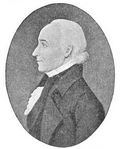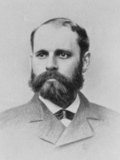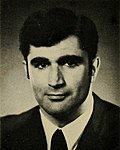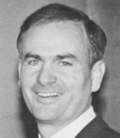Secretary of the Commonwealth of Massachusetts
 From Wikipedia - Reading time: 11 min
From Wikipedia - Reading time: 11 min
| Secretary of the Commonwealth of Massachusetts | |
|---|---|
 | |
since January 1, 1995 | |
| Government of Massachusetts | |
| Style | His Honor/Her honor |
| Status | Chief administrator Registrar of deeds Records officer Constitutional officer |
| Residence | None official |
| Seat | State House, Boston, Massachusetts |
| Nominator | Nominating petition, Political parties |
| Appointer | Popular vote |
| Term length | Four years, no limit |
| Constituting instrument | Constitution of Massachusetts |
| Formation | Original post: August 23, 1629[1] Current form: October 25, 1780 |
| Succession | Second |
| Unofficial names | Secretary of State |
| Website | www |
The secretary of the Commonwealth of Massachusetts is a constitutional officer in the executive branch of the Commonwealth of Massachusetts. Originally appointed under authority of the English Crown pursuant to the Charter of the Massachusetts Bay Company, the office of secretary of the Commonwealth (equivalent to "secretaries of state" in other U.S. jurisdictions) became an elective one in 1780.[a] Twenty-seven individuals have occupied the office of secretary of the Commonwealth over the ensuing centuries. The incumbent is William F. Galvin, a Democrat who has held the office since 1995.
Election
[edit]Term of office
[edit]The secretary of the Commonwealth is elected by the people on Election Day in November to four-year terms, and takes office on the third Wednesday of the January following a general election. There is no limit to the number of terms a secretary may hold.[2] Institutionally speaking, the secretary of the Commonwealth is thus completely independent of both the governor and General Court for the purpose of performing their official duties. These constitutional protections notwithstanding, the secretary may still be impeached for misconduct or maladministration by the House of Representatives and, if found guilty, removed from office by the Senate.[3]
Qualifications
[edit]Any person seeking election to the office of secretary of the Commonwealth must meet the following requirements:
- Be at least eighteen years of age;
- Be a registered voter in Massachusetts;
- Be a Massachusetts resident for at least five years when elected; and
- Receive 5,000 signatures from registered voters on nomination papers.[4]
Vacancies
[edit]In the event of a vacancy in the office of secretary of the Commonwealth, the General Court is charged, if in session, with electing from among the eligible citizens of the Commonwealth a successor to serve the balance of the prior secretary's term in office.[b] If, however, the vacancy occurs while the General Court is not in session, then responsibility for appointing a successor falls to the governor. The appointment is not valid without the advice and consent of the Governor's Council.[7]
Powers and duties
[edit]The Secretary of the Commonwealth oversees the Corporations Division, the Elections Division, the Massachusetts Archives, the Massachusetts Historical Commission, the Public Records Division, the Securities Division, as well as the State Records Center.
List of secretaries of the Commonwealth (1780 to present)
[edit]| No. | Secretary of the Commonwealth | Party | Years | Electoral/appointed history | |
|---|---|---|---|---|---|
| 1 |  |
John Avery, Jr. | Pro-Administration/Federalist | January 1, 1780 – June 7, 1806[8] |
Succeeded Samuel Adams, who had been Secretary of the Province of Massachusetts Bay from August 15, 1776, until January 1, 1780. Avery died in office, June 7, 1806.[8] |
| 2 | Jonathan L. Austin | Democratic-Republican | 1806 – 1808 |
[data missing] | |
| 3 |  |
William Tudor | Federalist | 1808 – 1810 |
[data missing] |
| 4 | Benjamin Homans | Democratic-Republican | 1810 – 1812 |
[data missing] | |
| 5 |  |
Alden Bradford | Federalist/National Republican | 1812 – 1824 |
[data missing] |
| 6 |  |
Edward D. Bangs | National Republican/Whig | 1824 – 1836 |
[data missing] |
| 7 |  |
John P. Bigelow | Whig | 1836 – 1843 |
[data missing] |
| 8 | John A. Bolles | Whig | 1843 – 1844 |
[data missing] | |
| 9 |  |
John G. Palfrey | Whig | 1844 – 1848 |
[data missing] |
| 10 |  |
William B. Calhoun | Whig[9] | January 1848[10] – 1851 |
[data missing] |
| 11 |  |
Amasa Walker | Whig | 1851 – 1853 |
[data missing] |
| 12 | Ephraim M. Wright | Whig | 1853 – 1856 |
[data missing] | |
| 13 | Francis De Witt | Know Nothing | 1856 – 1858 |
[data missing] | |
| 14 | Oliver Warner | Republican | 1858 – 1876 |
[data missing] | |
| 15 |  |
Henry B. Pierce | Republican | 1876 – 1891 |
[data missing] |
| 16 |  |
William M. Olin | Republican | 1891 – April 15, 1911 |
Died in office April 15, 1911. |
| Acting | Isaac H. Edgett | Republican | April 15, 1911 – April 28, 1911.[11] |
Edgett, was the First Deputy Secretary of the Commonwealth under William M. Olin.
As the First Deputy Secretary of the Commonwealth Edgett became the acting Secretary of the Commonwealth upon Olin's death. Edgett served as the acting Secretary of the Commonwealth[12] until Albert P. Langtry was elected by the Massachusetts legislature to serve out the remainder of Olin's term. | |
| 17 |  |
Albert P. Langtry | Republican[13] | April 28, 1911[11] | Elected by the Legislature, on April 26, 1911, to fill the vacancy caused by the death of William M. Olin. Langtry assumed the office of Secretary of the Commonwealth on April 28, 1911.[11] |
| 18 |  |
Frank J. Donahue | Democratic[13] | January 15, 1913 – 1915 |
[data missing] |
| 19 |  |
Albert P. Langtry | Republican | 1915 – 1921 |
[data missing] |
| 20 |  |
Frederic W. Cook | Republican[14] | 1921 – 1949 |
[data missing] |
| 21 | Edward J. Cronin | Democratic | 1949 – November 24, 1958 |
Died in office on November 24, 1958. | |
| Acting | J. Henry Goguen | Democratic | December 1, 1958 – January 20, 1959 |
[data missing] | |
| 22 | Joseph D. Ward |
Democratic[15] | January 20, 1959 – 1961 |
[data missing] | |
| 23 |  |
Kevin H. White | Democratic | 1961 – December 20, 1967 |
First elected in 1960. Re-elected in 1962. Re-elected in 1964 to a four-year term after the length of terms was extended. Resigned to become Mayor of Boston. |
| 24 |  |
Jack Davoren | Democratic | 1967 – 1974 |
[data missing] |
| 25 |  |
Paul H. Guzzi | Democratic | 1975 – 1978 |
[data missing] |
| 26 |  |
Michael J. Connolly | Democratic | 1979 – 1994 |
[data missing] |
| 27 |  |
William F. Galvin | Democratic | January 1, 1995 – present |
[data missing] |
See also
[edit]Notes
[edit]- ^ Massachusett's Office of the Secretary of the Commonwealth is therefore the oldest operating secretary of state's office in the United States.
- ^ Citizens of the Commonwealth of the Massachusetts are officially designated as "Bay Staters". Being a Bay Stater implies concurrent U.S. citizenship, which is required in order to vote in Massachusetts and to run for any public office, including that of secretary of the Commonwealth.[5][6]
References
[edit]- ^ "Records of the governor and company of the Massachusetts bay in New England. Printed by order of the legislature". Boston, W. White, printer to the commonwealth. 1853.
- ^ "Article LXIV, Constitution of the Commonwealth of Massachusetts". General Court of Massachusetts. Retrieved April 8, 2024.
- ^ "Article VIII, Constitution of the Commonwealth of Massachusetts". General Court of Massachusetts. Retrieved April 8, 2024.
- ^ "How to Run for Office in Massachusetts" (PDF). Massachusetts Secretary of the Commonwealth. March 2017. Retrieved December 26, 2022.
- ^ "Massachusetts General Laws, Chapter 2, Section 35: Designation of citizens of commonwealth". General Court of Massachusetts. Retrieved April 8, 2024.
- ^ "Registering to Vote". Elections Division, Massachusetts Office of the Secretary of the Commonwealth. Retrieved April 8, 2024.
- ^ "Article XVII, Constitution of the Commonwealth of Massachusetts". General Court of Massachusetts. Retrieved April 8, 2024.
- ^ a b Roberts, Oliver Ayer (1901), History of the Military company of the Massachusetts, now called the Ancient and Honorable Artillery Company of Massachusetts 1637-1888. Vol. II - 1738-1821, Boston, MA: Alfred Mudge & Son, Printers, p. 196
- ^ William B. Calhoun at the Biographical Directory of the United States Congress. Retrieved on October 6, 2007.
- ^ Dexter, Franklin Bowditch (1912), Biographical Sketches of the Graduates of Yale College With Annals of the College History, Vol. VI September; 1805 - September; 1815, New Haven, Ct: Yale University Press, p. 629
- ^ a b c Boston Daily Globe (April 29, 1911), LANGTRY IN NEW OFFICE. The Netherlands Club Pays Him a Visit and Presents Him a Bunch of Roses., Boston, Mass: Boston Daily Globe, p. 9
- ^ Boston Daily Globe (April 18, 1911), HOUSE RECORDED FOR INCOME TAX Walker Asks Reconsideration--- Senate Adopts 54-Hour Bill. Insane Hospital Inquiry Killed--- Anti-Lorimer Resolution. IMPORTANT EVENTS AT STATE HOUSE YESTERDAY., Boston, MA: The Boston Daily Globe, p. 1
- ^ a b "FOSS AND FROTHINGHAM WIN" (PDF). The New York Times. September 27, 1911. p. 2. Retrieved October 6, 2007.
- ^ "MANY SEEK OFFICE IN MASSACHUSETTS". The New York Times. August 9, 1922. p. 6. Retrieved October 6, 2007.
- ^ "In Memoriam". Holy Cross Magazine. Archived from the original on September 5, 2004. Summer 2003. Retrieved on October 6, 2007.
- "The States" (PDF). National Association of Secretaries of State. Retrieved October 6, 2007.
- "Special Collections - Burrill File". State Library of Massachusetts. Retrieved October 6, 2007.
External links
[edit]- Official site
- Office of the Secretary of State, hdl:2452/35811. (Various documents).
 KSF
KSF